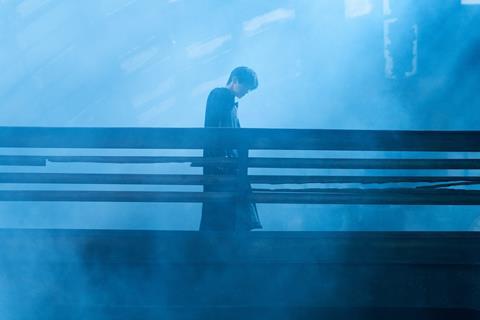Period-hopping Competition title also stars Shu Qi and Li Gengxi

Dir: Bi Gan. China/France. 2025. 155mins
Bi Gan’s Resurrection reframes the history of cinema as a kind of twentieth-century monster story that pans out over six time-distanced episodes with no clear connection. Packed with dazzling sets and effects, and touching on multiple genres and styles, it is a sometimes exhausting ride – especially when we’re struggling to engage with a changing cast of characters rooted in Chinese places, history, legend and religion. But it’s also a memorable and exhilarating one.
Almost entirely unclassifiable
This is Bi Gan’s third film following Kalli Blues and Long Day’s Journey Into Night, the latter of which played Un Certain Regard at Cannes before enjoying a healthy festival run and winning three Golden Horse awards. Both of those films were poetic, allusive dramas of loss with fragmented narratives, operating in clearly defined genres. Kalli Blues was a road movie of sorts, Long Day’s Journey Into Night a wild, dreamlike spin on the missing person quest. Resurrection is, by contrast, almost entirely unclassifiable, and will need to be marketed carefully. It could, however, well pique the the interest of adventurous cineastes prepared to surrender themselves to a work of astonishing audacity.
Early on, intertitles with a silent-era feel tell us that the story will be about ‘Fantasmers’ – creatures who ‘continue to dream’ in an era when this activity has become frowned upon. That suggests sci-fi – but the director has crafted a sci-fi of the past. An opening fantasy sequence that takes us through an opium den seems real until we notice a giant hand fiddling with the set. After further expressionistic leaps, laced with mesmeric revolving flower effects, we meet one of these ‘Fantasmers’, played by young Chinese megastar Jackson Yee.
He’s a ghoulish, pain-wracked monster in the Hunchback Of Notre Dame mould – until an enigmatic photographer (Shu Qi) takes pity on him and activates a projector hidden in his back. Suddenly, this Fantasmer is in a meadow, re-enacting the comic hosepipe schtick from the Lumiere Brothers 1895 short L’Arrosseur Arrosé.
Nothing else in the film quite matches the vertiginous dazzle of that first hallucinatory segment. Certainly not the second, which appears to be set in the China of the 1920s. It’s a baffling noir, full of smoky atmosphere, in which Yee’s suddenly young and handsome Fantasmer is arrested and tortured by police searching for a missing suitcase. Mirrors shatter and reflect unreliably, and there’s a war going on.
The third segment brings some respite from what has been a dizzying narrative dance. Set in an abandoned monastery, it’s a wryly comic tale, infused with the picaresque tone of ancient Chinese legend, that centres on a former Buddhist monk called Mongrel and the coarse, singlet-wearing Spirit of Bitterness that he inadvertently conjures up.
Gradually it dawns on us that the four central chapters circle around four of our five senses. It’s hearing in the 1920s noir, taste in the monastery segment, and smell in the film’s most engaging story, which appears to be set in the 1950s – a story of a card-trick con man and the stray pre-adolescent girl that he trains to recognise the suit and number of a hidden card by its aroma.
The penultimate, longest section, before a valedictory coda, is set on New Year’s Eve in 1999 in the run-down harbour district of some unnamed port city. The Fantasmer has now become a blond street tough in a world of gangsters; he meets up with singer and gangland moll Tai Zhaomei (Li Gengxi). Both characters trace a lineage back through Wong Kar-wai’s early films to the insouciant, fatalistic lovers of Godard or Melville. Touch appears to be the dominant sense here, though there’s plenty of taste and colour too in a sudden, unexpected vampire’s bite.
Referencing Bach’s sacred song ‘Come, sweet death, come blessed rest’ in which the singer prays five times for the release of death, Resurrection feels like an elegy for an artform. It is also an intensely, sometimes hermetically personal project done on a vast scale, using all the resources, analogue and digital, that today’s film industry can summon.
Production companies: Huace Pictures, Dangmai Films, CG Cinema
International sales: Les Films du Losange
Producers: Shan Zuolong, Charles Gillibert, Yang Lele
Screenplay: Bi Gan, Zhai Xiaohui
Cinematography: Dong Jingsong
Production design: Liu Qiang, Tu Nan
Editing: Bi Gan, Bai Xue
Music: M83 (Anthony Gonzalez)
Main cast: Jackson Yee, Shu Qi, Mark Chao, Li Gengxi, Huang Jue, Chen Yongzhong, Guo Mucheng, Zhang Zhijian
























